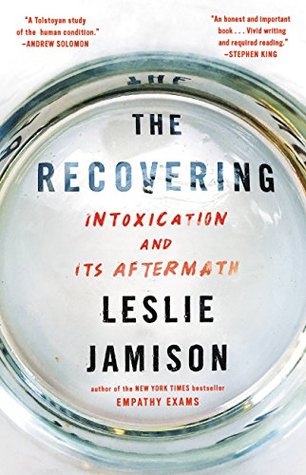More on this book
Community
Kindle Notes & Highlights
Our stories were valuable because of this redundancy, not despite it. Originality wasn’t the ideal, and beauty wasn’t the point.
I wanted to write a book that was honest about the grit and bliss and tedium of learning to live in this way—in chorus, without the numbing privacy of getting drunk.
I wanted to know if stories about getting better could ever be as compelling as stories about falling apart. I needed to believe they could.
When he told me, “Back there, I was in love with every fucking word coming out of your mouth,” it came as the confirmation of a hunch. I’d always suspected love came as a reward for saying the right things.
I idolized the iconic drunk writers because I understood their drinking as proof of extreme interior weather: volatile and authentic. If you needed to drink that much, you had to hurt, and drinking and writing were two different responses to that same molten pain.
My ability to find drunken dysfunction appealing—to fetishize its relationship to genius—was a privilege of having never really suffered. My fascination owed a debt to what Susan Sontag calls the “nihilistic and sentimental idea of ‘the interesting.’” In Illness as Metaphor, Sontag describes the nineteenth-century idea that if you were ill, you were also “more conscious, more complex psychologically.” Illness became an “interior décor of the body,” while health was considered “banal, even vulgar.”
Female drunks rarely got to strike the same rogue silhouettes as male ones. When they were drunk, they were like animals or children: dumbstruck, helpless, ashamed.
I had to spend several months comping, which was the Harvard way of saying “wanting something.”
My desire to be wanted was like something physically gushing out of me—need need need—and it disgusted me, this broken spigot I’d become. A man telling me he wanted to fuck me, whispering it into my ear, it was like taking the first sip of whiskey, that hit of warmth, straight to my gut. The beginning was usually better than what followed: the cotton-mouthed morning, the strange bed, sweat on the sheets.
A single moment: That day, my father told me drinking wasn’t wrong, but it was dangerous. It wasn’t dangerous for everyone, but it was dangerous for us.
Certain truths had turned transparent as glass, because they were so ingrained: People would probably leave, it was just a question of when. Attention was something I had to earn, not something I could take for granted. I had to seduce at all moments.
Falling in love was the only sensation that had ever truly rivaled drinking—for buzz and transportation, sheer immersive force—and with Peter they came conveniently entwined.
All my life I had believed—at first unwittingly, then explicitly—that I had to earn affection and love by being interesting, and so I had frantically tried to become really fucking interesting. Once I hit the right relationship, I planned to hurl my interestingness at it, like a final exam I’d spent my whole life studying for. This was it.
It’s true that people loved getting fucked up long before capitalism, but it’s also true that one of the core promises of capitalism—transformation through consumption—is another version of the promise addiction makes. Make something of yourself: This is one of the secular articles of faith in the American gospel of productivity.
Booze promised relief from the default state of needing something from men.
What does the concept of recovery mean? It can mean healing, repair, relocation, reclamation, or recuperation.
French philosopher Catherine Malabou proposes three different visions of recovery, attaching each one to an animal: the phoenix, the spider, and the salamander.
Though I saw us living in binary—Dave wanted to be free, and I wanted to be certain—in truth we were asking so many of the same questions: what it meant to let your edges dissolve, to be surprised, to touch some dream or being larger than yourself.
Long ago, I had learned that to become a writer I had to resist clichés at all costs. It was such accepted dogma that I’d never wondered why it was true.
I spent most of the party watching Dave talk to Destiny, following her body around the room, keenly aware of every moment they were standing together and laughing. I’d never felt so primal, like an animal tracking the movements of another animal—a mating rival. I’d never been so fully present in my own jealousy, without any numbing agent in sight. It was like waking up during a surgery I was supposed to stay unconscious for.
My insecurity had convinced me I didn’t have the power to hurt anyone.
Whatever it was, I needed to believe in something stronger than my willpower. This willpower was a fine-tuned machine, fierce and humming, and it had done plenty of things—gotten me straight A’s, gotten my papers written, gotten me through cross-country training runs—but when I’d applied it to drinking, the only thing I felt was that I was turning my life into a small, joyless clenched fist.
went to an old cemetery shrine with a secret grotto of quartz inside a concrete tree stump, with jittery music fluted from interior speakers. I needed that, something twinkling inside. I needed the world to tell me there was more out there, waiting.
Emotion was my compulsion and obsession, the organ through which I processed the world—turning it to praise and harm like the liver turns ethyl alcohol to acetaldehyde and acid. I could do better.
I knew that I wanted him to be happy but worried that I resented him too much to make him happy.
It seems there are two kinds of American writers. Those who drink, and those who used to.
If you talk to enough recovering alcoholics in cold climates, I can promise you will hear someone compare his sobriety to shoveling snow.


